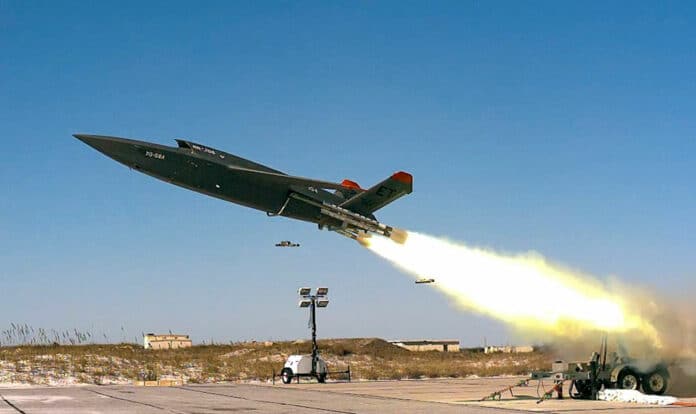The US Air Force’s XQ-58A Valkyrie experimental combat drone recently completed a successful test flight demonstrating the ability to carry out aerial combat tasks autonomously using new artificial intelligence-driven software.
The uncrewed aircraft completed a three-hour sortie at the Eglin Test and Training Complex in Florida on July 25, 2023. The flight builds upon four years of partnership that began with the Skyborg Vanguard and the Autonomous Aircraft Experimentation (AAx) programs.
The machine-learning-trained artificial intelligence algorithms for the test were developed by AFRL’s Autonomous Air Combat Operations (AACO) program team.
“The mission proved out a multi-layer safety framework on an AI/ML-flown uncrewed aircraft and demonstrated an AI/ML agent solving a tactically relevant “challenge problem” during airborne operations,” Col. Tucker Hamilton, Air Force AI Test and Operations chief and 96th Operations Group commander said in a statement. “This sortie officially enables the ability to develop AI/ML agents that will execute modern air-to-air and air-to-surface skills that are immediately transferrable to the CCA program.”
The algorithms for the flight took millions of hours to mature in simulations during sorties on the X-62 VISTA experimental aircraft, Hardware-in-the-Loop events with the XQ-58A, and ground test operations.
The Kratos XQ-58 Valkyrie is a low-cost, high-performance unmanned air vehicle developed through an Air Force Research Laboratory partnership with Kratos Defense & Security Solutions. This aircraft falls under the AFRL Low-Cost Attritable Aircraft Technology portfolio.
The XQ-58 is aimed at developing the necessary technology to create a jet-powered autonomous combat drone that can operate as part of a swarm of drones, with or without direct pilot control. The 30 feet (9.1 meters) long drone has a wingspan of 27 feet (8.2 meters), a top speed of 567 knots (1,050 km/h), a range of 2,128 nm (3,941 km), and a service ceiling of 45,000 feet (14,000 meters).
“AI will be a critical element to future warfighting and the speed at which we’re going to have to understand the operational picture and make decisions,” said Brig. Gen. Scott Cain, AFRL commander. “AI, Autonomous Operations, and Human-Machine Teaming continue to evolve at an unprecedented pace, and we need the coordinated efforts of our government, academia, and industry partners to keep pace.”
